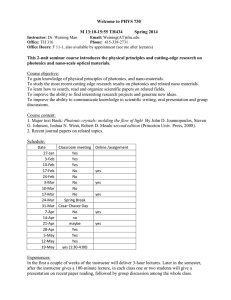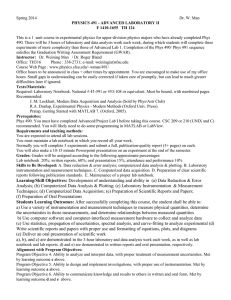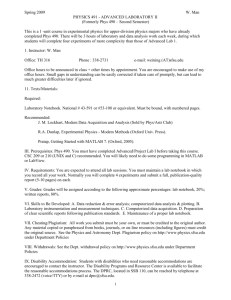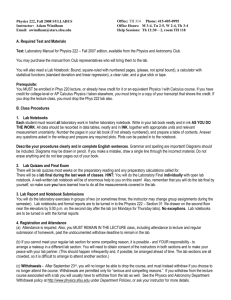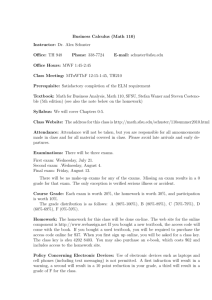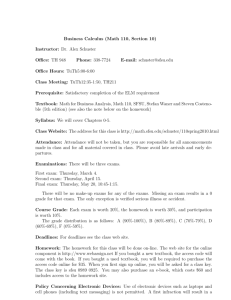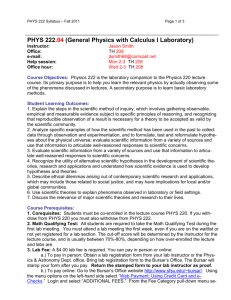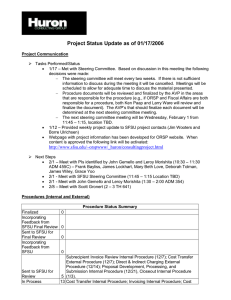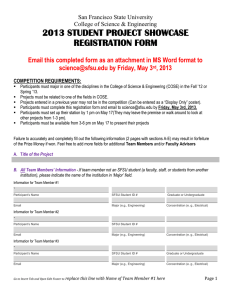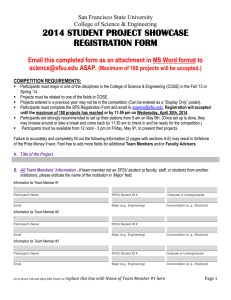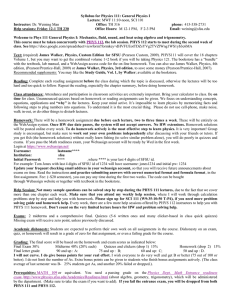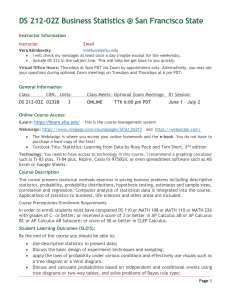11FP490syllabus.doc
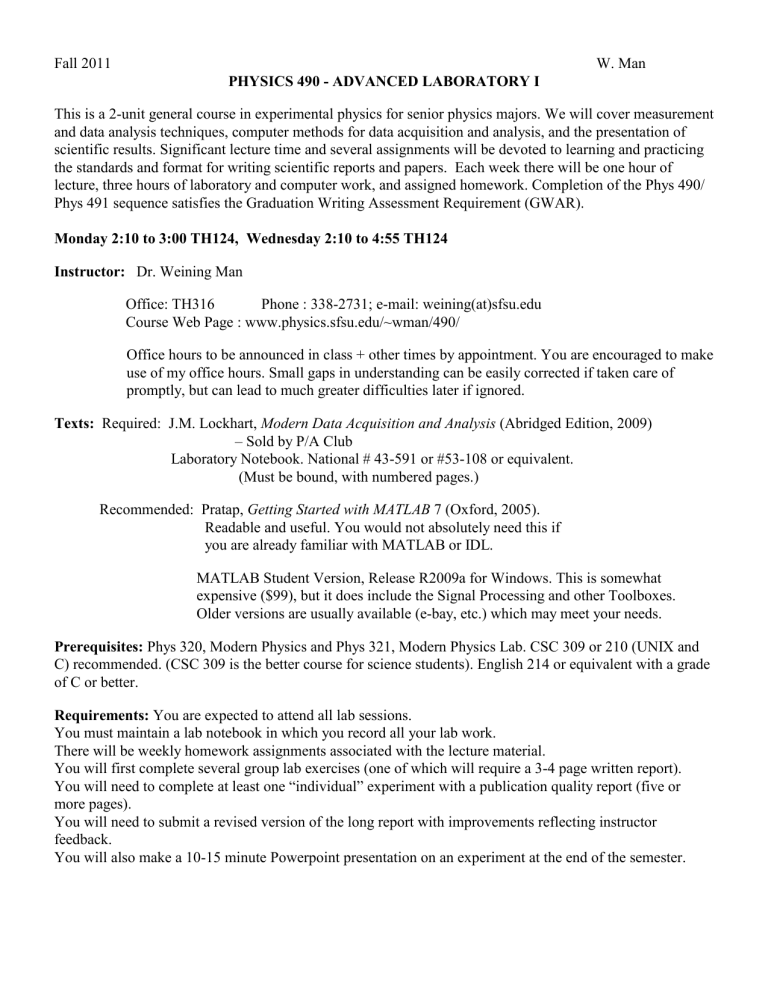
Fall 2011
PHYSICS 490 - ADVANCED LABORATORY I
W. Man
This is a 2-unit general course in experimental physics for senior physics majors. We will cover measurement and data analysis techniques, computer methods for data acquisition and analysis, and the presentation of scientific results. Significant lecture time and several assignments will be devoted to learning and practicing the standards and format for writing scientific reports and papers. Each week there will be one hour of lecture, three hours of laboratory and computer work, and assigned homework. Completion of the Phys 490/
Phys 491 sequence satisfies the Graduation Writing Assessment Requirement (GWAR).
Monday 2:10 to 3:00 TH124, Wednesday 2:10 to 4:55 TH124
Instructor: Dr. Weining Man
Office: TH316 Phone : 338-2731; e-mail: weining(at)sfsu.edu
Course Web Page : www.physics.sfsu.edu/~wman/490/
Office hours to be announced in class + other times by appointment. You are encouraged to make use of my office hours. Small gaps in understanding can be easily corrected if taken care of promptly, but can lead to much greater difficulties later if ignored.
Texts: Required: J.M. Lockhart, Modern Data Acquisition and Analysis (Abridged Edition, 2009)
– Sold by P/A Club
Laboratory Notebook. National # 43-591 or #53-108 or equivalent.
(Must be bound, with numbered pages.)
Recommended: Pratap, Getting Started with MATLAB 7 (Oxford, 2005).
Readable and useful. You would not absolutely need this if
you are already familiar with MATLAB or IDL.
MATLAB Student Version, Release R2009a for Windows. This is somewhat
expensive ($99), but it does include the Signal Processing and other Toolboxes.
Older versions are usually available (e-bay, etc.) which may meet your needs.
Prerequisites: Phys 320, Modern Physics and Phys 321, Modern Physics Lab. CSC 309 or 210 (UNIX and
C) recommended. (CSC 309 is the better course for science students). English 214 or equivalent with a grade of C or better.
Requirements: You are expected to attend all lab sessions.
You must maintain a lab notebook in which you record all your lab work.
There will be weekly homework assignments associated with the lecture material.
You will first complete several group lab exercises (one of which will require a 3-4 page written report).
You will need to complete at least one “individual” experiment with a publication quality report (five or more pages).
You will need to submit a revised version of the long report with improvements reflecting instructor feedback.
You will also make a 10-15 minute Powerpoint presentation on an experiment at the end of the semester.
Grades: Grades will be assigned according to the following approximate percentages:
Lab attendance and exercises, 10%;
Lab notebook and exercises, 10%;
Homework, 20%;
One Oral presentation 10%;
Written reports (three), 50%;
Learning/Skill Objectives: Development of understanding and ability in (a) Data Reduction & Error
Analysis; (b) Computerized Data Analysis & Plotting; (c) Laboratory Instrumentation & Measurement
Techniques; (d) Computerized Data Acquisition; (e) Preparation of Scientific Reports and Papers;
(f) Preparation of Oral Presentations
Learning Outcomes: After successfully completing this course, the student shall be able to:
(a) Use a variety of instrumentation and measurement techniques to measure physical quantities, determine the uncertainties in those measurements, and determine relationships between measured quantities
( b) Use computer software and computer-interfaced measurement hardware to collect and analyze data
(c) Use statistics, propagation of uncertainties, spectral analysis, and curve-fitting to analyze experimental
(d) Write scientific reports and papers with proper use and formatting of equations, plots, and diagrams
(e) Deliver an oral presentation of scientific work
Cheating/Plagiarism: All work you submit must be your own, or must be credited to the original author.
You may work in a group on an experiment, and thus share data, but your report must be your own work.
Any material copied or paraphrased from books, journals, or on-line resources (including figures) must credit the original source. See the Physics and Astronomy Dept. Plagiarism policy on http://www.physics.sfsu.edu under Department Policies
Withdrawals: See the Dept. withdrawal policy on http://www.physics.sfsu.edu under Department Policies
Disability Accommodation: Students with disabilities who need reasonable accommodations are encouraged to contact the instructor. The Disability Programs and Resource Center is available to facilitate the reasonable accommodations process. The DPRC, located in SSB 110, can be reached by telephone at
338-2472 (voice/TTY) or by e-mail at dprc@sfsu.edu
.
Alignment with Program Objectives:
Program Objective 4. Ability to analyze and interpret data, with proper treatment of measurement uncertainties. Met by learning outcome c above.
Program Objective 5. Ability to design and implement investigations, with proper use of instrumentation.
Met by learning outcome a above.
Program Objective 6. Ability to communicate knowledge and results to others in written and oral form. Met by learning outcome d and e above.
Program Objective 7. Ability to utilize print and electronic resources, computers, and software to gain information and perform calculations. Met by learning outcome b above.
